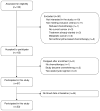Fatigue and sleep quality are associated with changes in inflammatory markers in breast cancer patients undergoing chemotherapy
- PMID: 22406004
- PMCID: PMC3372667
- DOI: 10.1016/j.bbi.2012.02.001
Fatigue and sleep quality are associated with changes in inflammatory markers in breast cancer patients undergoing chemotherapy
Abstract
Fatigue and sleep disturbances are two of the most common and distressing symptoms reported by cancer patients. Fatigue and sleep are also correlated with each other. While fatigue has been reported to be associated with some inflammatory markers, data about the relationship between cancer-related sleep disturbances and inflammatory markers are limited. This study examined the relationship between fatigue and sleep, measured both subjectively and objectively, and inflammatory markers in a sample of breast cancer patients before and during chemotherapy. Fifty-three women with newly diagnosed stage I-III breast cancer scheduled to receive at least four 3-week cycles of chemotherapy participated in this longitudinal study. Fatigue was assessed with the Multidimensional Fatigue Symptom Inventory-Short Form (MFSI-SF), sleep quality was assessed with the Pittsburgh Sleep Quality Index (PSQI) and objective sleep was measured with actigraphy. Three inflammatory markers were examined: Interleukin-6 (IL-6), Interleukin-1 receptor antagonist (IL-1RA) and C-reactive protein (CRP). Data were collected before (baseline) and during cycle 1 and cycle 4 of chemotherapy. Compared to baseline, more fatigue was reported, levels of IL-6 increased and IL-1RA decreased during chemotherapy. Reports of sleep quality remained poor. Mixed model analyses examining changes from baseline to each treatment time point revealed overall positive relationships between changes in total MFSI-SF scores and IL-6, between changes in total PSQI scores and IL-6 and IL-1RA, and between total wake time at night and CRP (all p's<0.05). These relationships suggest that cancer-related fatigue and sleep disturbances may share common underlying biochemical mechanisms.
Copyright © 2012 Elsevier Inc. All rights reserved.
Conflict of interest statement
References
-
- Allgayer H, Nicolaus S, Schreiber S. Decreased interleukin-1 receptor antagonist response following moderate exercise in patients with colorectal carcinoma after primary treatment. Cancer Detect Prev. 2004;28:208–213. - PubMed
-
- Ancoli-Israel S, Cole R, Alessi CA, Chambers M, Moorcroft WH, Pollak C. The role of actigraphy in the study of sleep and circadian rhythms. Sleep. 2003;26:342–392. - PubMed
-
- Aouizerat BE, Dodd M, Lee K, West C, Paul SM, Cooper BA, Wara W, Swift P, Dunn LB, Miaskowski C. Preliminary evidence of a genetic association between tumor necrosis factor alpha and the severity of sleep disturbance and morning fatigue. Biol Res Nurs. 2009;11:27–41. - PubMed
Publication types
MeSH terms
Substances
Grants and funding
LinkOut - more resources
Full Text Sources
Medical
Research Materials
Miscellaneous


